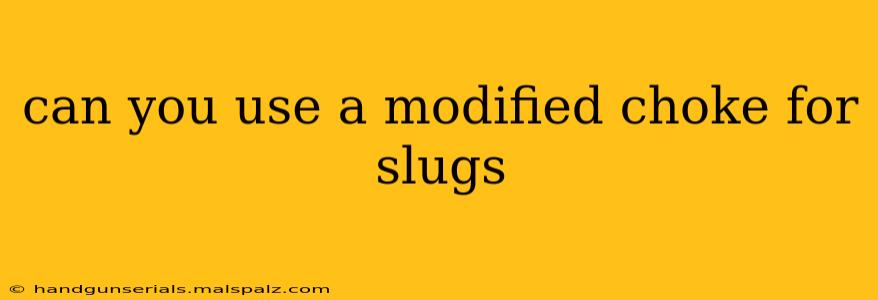Can You Use a Modified Choke for Slugs? A Comprehensive Guide
The question of whether you can use a modified choke for slugs is a common one among shotgun enthusiasts, particularly those who enjoy hunting or home defense scenarios. The answer, however, isn't a simple yes or no. It depends on several factors, and using the wrong choke can be dangerous. Let's delve into the specifics.
Understanding Shotgun Chokes and Their Purpose
Before discussing slug use, let's clarify the role of shotgun chokes. Chokes are constrictions at the muzzle of a shotgun barrel that control the pattern of the shot. Different chokes create different patterns:
- Full Choke: Produces the tightest pattern, ideal for long-range shots with birdshot.
- Modified Choke: Offers a tighter pattern than improved cylinder but a wider pattern than full choke, a good balance for various hunting situations with birdshot.
- Improved Cylinder: Creates a relatively open pattern, suitable for close-range shots with birdshot.
- Cylinder: The most open choke, providing a wide shot pattern.
These chokes are designed for shot, not slugs. Slugs are solid projectiles, unlike the pellets in birdshot or buckshot.
Using a Modified Choke with Slugs: The Risks and Realities
While some shooters use a modified choke with slugs, it's generally not recommended. Here's why:
-
Accuracy: A modified choke might slightly improve accuracy at close ranges compared to a cylinder bore, but this benefit is minimal and often overshadowed by potential drawbacks. The tighter constriction can introduce inconsistencies and potentially affect accuracy negatively, especially at longer distances.
-
Pressure Buildup: Using a choke designed for shot with a slug can lead to increased pressure inside the barrel. This increased pressure isn't always significant enough to cause immediate damage to the firearm, but it can contribute to premature wear and tear, potentially leading to malfunctions or even catastrophic failure over time.
-
Barrel Obstruction: In rare cases, a tight choke like modified can potentially impede the slug's exit from the barrel, causing a dangerous obstruction and potentially leading to a barrel burst. This is far more likely with longer slugs or those with less streamlined designs.
Best Practices for Shooting Slugs
For optimal slug performance and safety, consider these best practices:
-
Use a Cylinder Bore or a Slug-Specific Choke: A cylinder bore barrel is generally the safest and most reliable option for firing slugs. Some shotguns even offer dedicated slug chokes designed specifically for optimal slug performance. These chokes are engineered to minimize pressure buildup and maximize accuracy.
-
Consult Your Firearm's Manual: Always refer to your shotgun's owner's manual for specific recommendations regarding choke use and ammunition types. The manufacturer's instructions should always take precedence.
-
Choose the Right Ammunition: The type of slug you use also affects accuracy and safety. Different slugs have varying designs and weights, influencing how they react within the barrel.
-
Practice Safe Handling: Always follow safe firearm handling practices, regardless of the ammunition type or choke used.
Conclusion: Prioritize Safety and Accuracy
While using a modified choke with slugs might not immediately cause catastrophic failure, it’s generally not the best practice. The potential risks, such as increased pressure buildup and reduced accuracy, outweigh any minimal benefits. Prioritizing safety and accuracy by using a cylinder bore or a dedicated slug choke is crucial for any responsible shotgun user. Always consult your firearm's manual and prioritize safe gun handling techniques.

